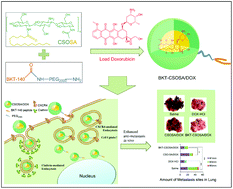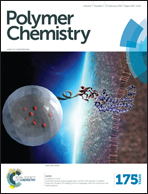Synthesis and biological application of BKT-140 peptide modified polymer micelles for treating tumor metastasis with an enhanced cell internalization†
Abstract
In recent years, polymer micelles have been investigated as targeted drug delivery systems for treating tumors. However, passive targeted drug delivery systems failed in accumulation at dispersive tumor metastasis sites, which led to a poor prognosis of tumor metastasis. The chemokine receptor CXCR4, which is often highly expressed in metastatic tumor cells, regulates tumor cell trafficking during the metastasis process and is related to the invasive response of tumor cells, is a potential targeting site. In this study, the BKT-140 peptide, a specific CXCR4 inhibitor, was conjugated on the surface of chitosan based polymer micelles (BKT-CSOSA). After peptide modification, in CXCR4 high expressing cells BKT-CSOSA showed a considerable increase of cell uptake by receptor-mediated cell internalization. However, in CXCR4 low expressing cells there was no obvious change in uptake efficiency but the main uptake pathway was altered from clathrin-mediated endocytosis into macropinocytosis. Doxorubicin loaded BKT-CSOSA micelles (BKT-CSOSA/DOX) showed an enhanced anti-metastasis effect on cell migration and cell invasion in vitro. It was further confirmed that BKT-CSOSA/DOX micelles decreased tumor metastasis sites’ formation in the lung. Both CSOSA and BKT-CSOSA micelles were mainly located in the liver, spleen and lung in vivo, but BKT-CSOSA showed an enhanced accumulation in the lung. This study demonstrates that BKT-140 modification notably increased the cell internalization of polymer micelles in metastatic tumor cells and enhanced the inhibition effect on lung metastasis sites’ formation.


 Please wait while we load your content...
Please wait while we load your content...